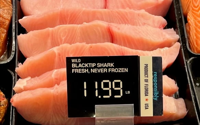
Photo by GEORGE DESIPRIS via Pexels
By Stephen Beech
Meat from "critically endangered" sharks is being sold in grocery stores, reveals a new report.
Researchers found that shark meat sold in U.S. grocery stores, seafood markets, and online vendors often comes from endangered species and is often mislabeled.
They bought and DNA barcoded 29 shark meat products to determine their species identity.
The findings showed that 93% of samples were "ambiguously" labeled and included meat from 11 different shark species.
Among the species identified were the great hammerhead and scalloped hammerhead, both listed as "critically endangered" by the International Union for Conservation of Nature (IUCN).
Since the 1970s, shark populations have declined by more than 70% due to unsustainable practices including overfishing, habitat destruction, pollution and climate change.
But the study revealed meat from endangered shark species is still being sold to American shoppers, sometimes for as little as $2.99 (£2.99) per lb.
Study first author Dr. Savannah Ryburn, from the University of North Carolina, said: “Mislabeling and ambiguous labeling remove consumers’ ability to choose what they are putting in their bodies.

(SWNS)
“For example, two species in our study, scalloped hammerhead and great hammerhead, were ambiguously labelled as ‘shark’ - even though they are strongly advised against consumption due to their very high mercury levels.
"Without accurate and precise labelling, consumers cannot avoid purchasing these products.”
The research team found that of the 29 products tested, 27 were labelled simply as “shark” or “mako shark” without a species designation.
Even among the two products that were labeled with a species name, one turned out to be incorrect.
Almost a third (31%) of the bought samples turned out to be from four endangered or critically endangered species: great hammerhead, scalloped hammerhead, tope, and shortfin mako shark.
The others were from another seven species, including the vulnerable spinner, lemon, common tresher, and blacktip shark, and the near threatened smooth-hound and Pacific angelshark.
The researchers say their findings, published in the journal Frontiers in Marine Science, highlight a "major gap" in seafood transparency and consumer safety.
Professor John Bruno, co-instructor of the seafood forensics class that conducted the research, said: “The United States should require seafood distributors to provide species-specific names for the products being sold."

Photo by Magda Ehlers via Pexels
He said that shark meat is known to contain high levels of mercury, which can pose "serious risks" to human health, particularly for children and moms-to-be.
The research team emphasized that accurate labelling is essential not only for conservation, but also for consumer protection.
Dr. Ryburn said: “Sharks such as great and scalloped hammerheads are the ocean’s equivalent of lions, and we were shocked by how cheaply the meat of these rare, long-lived apex predators was sold.
“Some samples were only $2.99 per pound.
“The legality of selling shark meat in the United States depends largely on where the shark was harvested and the species involved, due to regulations under CITES and the Endangered Species Act.
“However, by the time large shark species reach grocery stores and markets, they are often sold as fillets with all distinguishing features removed, making it unlikely that sellers know what species they are offering.”
The researchers say stronger regulations and oversight of seafood labelling practices are needed.
Dr. Ryburn added: “Sellers in the United States should be required to provide species-specific names, and when shark meat is not a food security necessity, consumers should avoid purchasing products that lack species-level labelling or traceable sourcing."



















(0) comments
Welcome to the discussion.
Log In
Keep it Clean. Please avoid obscene, vulgar, lewd, racist or sexually-oriented language.
PLEASE TURN OFF YOUR CAPS LOCK.
Don't Threaten. Threats of harming another person will not be tolerated.
Be Truthful. Don't knowingly lie about anyone or anything.
Be Nice. No racism, sexism or any sort of -ism that is degrading to another person.
Be Proactive. Use the 'Report' link on each comment to let us know of abusive posts.
Share with Us. We'd love to hear eyewitness accounts, the history behind an article.